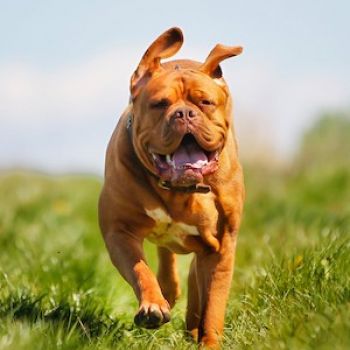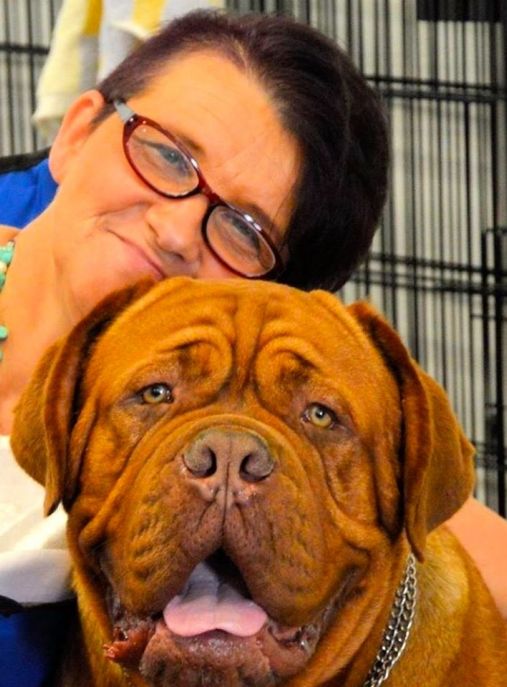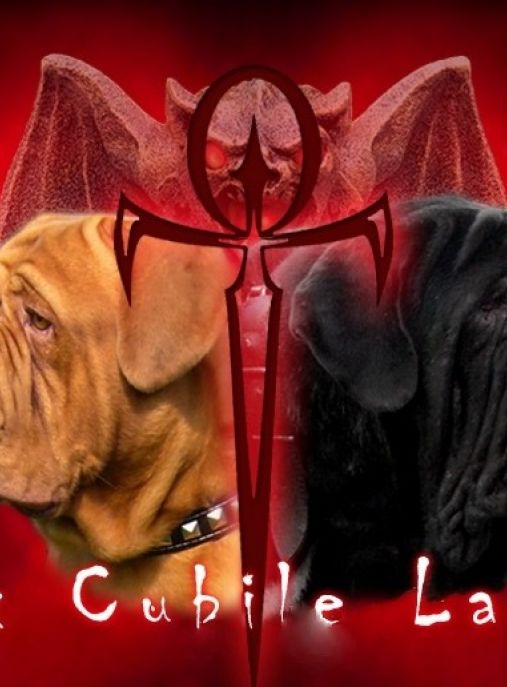The Dogue de Bordeaux, also known as the Bordeaux Mastiff, is a large and powerful dog breed that originated in France. With its massive head, muscular body, and distinctive wrinkled face, the Dogue de Bordeaux is an imposing and noble-looking breed. This breed is known for its loyalty, protective nature, and gentle temperament, making it a popular choice for families and individuals seeking a devoted companion.
The history of the Dogue de Bordeaux dates back centuries, with evidence of its existence as early as the 14th century. It is believed to have descended from ancient mastiff-type dogs that were used for various purposes, including guarding, hunting, and even fighting. The breed's name is derived from the city of Bordeaux in southwestern France, where it was primarily developed.
According to the FCI (Fédération Cynologique Internationale) typology, the Dogue de Bordeaux belongs to Group 2 - Pinscher and Schnauzer type, Molossian type, and Swiss Mountain and Cattle Dogs. This classification places the breed among other large and powerful dogs with similar physical characteristics.
The Dogue de Bordeaux is primarily bred as a companion and family dog. Its protective nature and loyalty make it an excellent guard dog, always ready to defend its family and property if necessary. Despite its imposing appearance, this breed is known for its gentle and affectionate nature, making it a great choice for families with children. However, due to its size and strength, early socialization and training are essential to ensure proper behavior and obedience.
In terms of physical characteristics, the Dogue de Bordeaux is a large and muscular breed. Males typically weigh between 110-145 pounds (50-65 kg), while females weigh slightly less, ranging from 99-120 pounds (45-54 kg). The height of males ranges from 23.5-27 inches (60-68 cm), while females are slightly smaller, measuring between 22-25.5 inches (56-65 cm) at the shoulder.
The life expectancy of the Dogue de Bordeaux is around 8-10 years, which is relatively shorter compared to some other dog breeds. This breed is prone to certain health issues, including hip and elbow dysplasia, heart problems, and various types of cancer. Regular exercise, a balanced diet, and routine veterinary care are crucial for maintaining the overall health and well-being of this breed.
One of the most distinctive features of the Dogue de Bordeaux is its massive head, which is proportionate to its body size. The head is broad and wrinkled, with a pronounced stop and a strong, square-shaped muzzle. The breed's eyes are medium-sized, set wide apart, and have a dark brown color. The ears are relatively small, hanging down and slightly rounded at the tips.
The Dogue de Bordeaux has a short and dense coat that comes in various shades of fawn, ranging from light to dark. Some individuals may have a small white patch on the chest, but excessive white markings are considered undesirable in the show ring. Despite its short coat, this breed is known to shed moderately throughout the year, requiring regular brushing to keep its coat healthy and clean.
In addition to its physical appearance, the Dogue de Bordeaux has a calm and gentle temperament. This breed is known for its affectionate and loyal nature towards its family, often forming strong bonds with its owners. While they are generally good with children, it is important to supervise interactions between the dog and young children due to their size and strength.
Despite their calm demeanor, the Dogue de Bordeaux can be protective and reserved around strangers. Early socialization is crucial to ensure that they are well-adjusted and comfortable in various social situations. Training should be firm, yet gentle, as this breed responds best to positive reinforcement techniques.
In conclusion, the Dogue de Bordeaux is a majestic and powerful breed that combines strength with a gentle and loyal nature. With its imposing appearance and protective instincts, this breed makes an excellent guard dog and companion for families. However, potential owners should be aware of the breed's specific needs, including early socialization, regular exercise, and proper healthcare, to ensure a happy and healthy life for their Dogue de Bordeaux.
The Dogue de Bordeaux, also known as the Bordeaux Mastiff, is a magnificent and powerful breed that possesses a unique character. With their massive size and muscular build, these dogs exude strength and confidence. However, beneath their imposing appearance lies a gentle and loyal nature that makes them wonderful companions and family pets.
One of the most notable traits of the Dogue de Bordeaux is their calm and patient demeanor. They are known for being incredibly tolerant, especially with children, and are often described as "nanny dogs." This breed is highly affectionate and forms strong bonds with their family members, often seeking out physical contact and cuddles. Their loving nature makes them excellent therapy dogs and emotional support animals.
Despite their gentle nature, Dogue de Bordeaux dogs are also incredibly protective and possess a strong guarding instinct. They are naturally wary of strangers and will go to great lengths to protect their loved ones and property. Early socialization is crucial to ensure they can distinguish between genuine threats and harmless situations. Proper training and exposure to various people, animals, and environments will help them develop into well-rounded dogs.
Training a Dogue de Bordeaux requires a firm and consistent approach. These dogs are intelligent but can be stubborn at times, so it's important to establish yourself as a strong leader from the beginning. Positive reinforcement techniques, such as treats and praise, work best with this breed. Harsh training methods should be avoided as they can damage the dog's trust and confidence.
Exercise is essential for the physical and mental well-being of a Dogue de Bordeaux. Despite their size, they are not overly energetic dogs and are generally content with moderate exercise. Daily walks, playtime, and mental stimulation through puzzle toys or training sessions are sufficient to keep them happy and healthy. However, it's important to avoid excessive exercise, especially during hot weather, as they are prone to overheating due to their short muzzle.
Grooming a Dogue de Bordeaux is relatively low-maintenance. Their short coat requires regular brushing to remove loose hair and keep their skin healthy. They are moderate shedders, so occasional baths and nail trims are necessary. Additionally, attention should be given to their facial folds, as they can accumulate dirt and moisture, leading to skin infections. Regular cleaning with a damp cloth or specialized wipes will help prevent any issues.
When it comes to health, the Dogue de Bordeaux is generally a robust breed. However, like many large dogs, they are prone to certain health conditions, including hip and elbow dysplasia, heart problems, and bloat. Regular veterinary check-ups, a balanced diet, and appropriate exercise can help minimize the risk of these issues.
In conclusion, the Dogue de Bordeaux is a gentle giant with a loving and protective nature. They are loyal and devoted to their families, making them excellent companions. With proper training, socialization, and care, these dogs can thrive in various environments and bring joy and happiness to their owners' lives.
The Dogue de Bordeaux, also known as the Bordeaux Mastiff, is a large and powerful breed that requires specific care to ensure their well-being and happiness. Here are some tips on how to properly care for a Dogue de Bordeaux:
1. Exercise: Despite their size, Dogue de Bordeaux dogs are not overly active. They have a moderate exercise requirement, so daily walks and playtime in a secure area are sufficient. Avoid excessive exercise, especially during hot weather, as they are prone to overheating.
2. Grooming: The Bordeaux Mastiff has a short, dense coat that requires minimal grooming. Regular brushing with a soft bristle brush will help keep their coat healthy and remove loose hair. Bathing should be done only when necessary to avoid drying out their skin.
3. Feeding: Proper nutrition is crucial for the health of a Dogue de Bordeaux. Feed them a high-quality, balanced diet suitable for large breeds. Avoid overfeeding, as this breed is prone to obesity, which can lead to various health issues. Consult with a veterinarian to determine the appropriate portion sizes and feeding schedule.
4. Health care: Regular veterinary check-ups are essential to monitor the overall health of your Dogue de Bordeaux. Vaccinations, parasite prevention, and dental care should be maintained according to your veterinarian's recommendations. This breed is prone to certain health conditions, including hip and elbow dysplasia, heart problems, and skin allergies, so early detection and treatment are crucial.
5. Socialization and training: Early socialization is vital for a Dogue de Bordeaux to develop into a well-rounded and well-behaved companion. Expose them to various people, animals, and environments from a young age. Positive reinforcement training methods work best with this breed, as they are sensitive and eager to please.
6. Temperament: Dogue de Bordeaux dogs are known for their loyalty, affection, and gentle nature. They thrive on human companionship and should not be left alone for extended periods. They are excellent family dogs but may be reserved with strangers. Early and ongoing socialization can help them become more comfortable in different situations.
7. Climate considerations: Due to their short muzzle, Dogue de Bordeaux dogs are sensitive to extreme temperatures. They are prone to heatstroke, so it's crucial to provide them with a cool and shaded environment during hot weather. In cold weather, provide them with a warm and comfortable shelter.
8. Safety precautions: As a large and powerful breed, Dogue de Bordeaux dogs require a secure and sturdy fence to prevent them from escaping. They should always be on a leash when outside of a secure area. Supervise interactions with small children and other pets to ensure everyone's safety.
What not to do:
1. Do not over-exercise your Dogue de Bordeaux, especially when they are young or during hot weather.
2. Avoid overfeeding or feeding inappropriate food, as this can lead to obesity and related health issues.
3. Do not neglect regular veterinary check-ups and vaccinations.
4. Avoid using harsh training methods or punishment, as this breed responds best to positive reinforcement.
5. Do not leave your Dogue de Bordeaux alone for long periods, as they thrive on human companionship.
6. Do not expose them to extreme temperatures without proper precautions.
7. Avoid leaving them unsupervised with small children or unfamiliar pets.
By following these care tips and avoiding common mistakes, you can provide your Dogue de Bordeaux with a happy, healthy, and fulfilling life. Remember, each dog is unique, so always pay attention to their individual needs and consult with professionals for personalized advice.
The Dogue de Bordeaux, also known as the Bordeaux Mastiff, is a majestic and powerful breed that possesses a distinct and captivating coat color. The common color of these dogs is a rich and deep shade of mahogany, which is often described as a reddish-brown hue. This unique coloration is one of the defining characteristics of the breed and adds to their overall allure and charm.
The mahogany color of the Dogue de Bordeaux's coat is truly striking and eye-catching. It exudes warmth and elegance, making these dogs stand out in any setting. The intensity of the color can vary slightly from dog to dog, with some individuals displaying a darker shade, while others may have a lighter tone. However, the overall color remains consistent and is a hallmark of the breed.
The mahogany coat of the Dogue de Bordeaux is often accompanied by a range of other markings that further enhance their appearance. These markings can include various shades of black, such as a black mask that covers the face, giving the dog a distinctive and regal look. Additionally, black patches or brindle patterns may be present on the body, adding depth and complexity to the overall coloration.
The texture of the Dogue de Bordeaux's coat is another noteworthy aspect. It is typically short, dense, and smooth, providing a sleek and polished appearance. This coat type not only contributes to the breed's aesthetic appeal but also serves as protection against the elements and potential injuries.
The mahogany color of the Dogue de Bordeaux's coat is not only visually appealing but also holds historical significance. It is believed to have originated from the breed's ancestors, which were used for various purposes, including guarding and hunting. The coloration helped these dogs blend into their surroundings, allowing them to approach their prey undetected.
Furthermore, the mahogany coat of the Dogue de Bordeaux is not only aesthetically pleasing but also serves as a reflection of the breed's temperament and personality. These dogs are known for their loyalty, courage, and protective nature. The deep and rich color of their coat symbolizes their strength and resilience, making them an ideal choice for those seeking a devoted and formidable companion.
In conclusion, the common color of the Dogue de Bordeaux, or Bordeaux Mastiff, is a captivating shade of mahogany. This reddish-brown hue, often accompanied by black markings, adds to the breed's overall allure and charm. The mahogany coat, along with its smooth texture, serves as a reflection of the dog's temperament and historical significance. Whether in appearance or character, the color of the Dogue de Bordeaux's coat is truly remarkable and contributes to their status as a majestic and beloved breed.
The Dogue de Bordeaux, also known as the Bordeaux Mastiff, is a majestic and powerful breed that requires special attention to maintain good health. These dogs have a robust and muscular build, with a distinctive wrinkled face and a strong, imposing presence. While generally healthy, like any breed, they are prone to certain health issues that owners should be aware of to ensure their well-being.
One of the most common health concerns in Dogue de Bordeaux dogs is hip dysplasia. This condition occurs when the hip joint does not develop properly, leading to discomfort, pain, and difficulty in movement. Regular exercise, a balanced diet, and maintaining a healthy weight can help reduce the risk of hip dysplasia. Additionally, it is advisable to have potential breeding dogs screened for this condition to prevent passing it on to future generations.
Another prevalent health issue in this breed is gastric dilatation-volvulus (GDV), commonly known as bloat. GDV is a life-threatening condition that occurs when the stomach fills with gas and twists on itself. This can lead to a rapid onset of symptoms, including restlessness, unproductive retching, and a distended abdomen. Immediate veterinary attention is crucial in these cases, and preventive measures such as feeding smaller, frequent meals and avoiding vigorous exercise after meals can help reduce the risk of bloat.
Dogue de Bordeaux dogs are also prone to various skin problems. Due to their loose and wrinkled skin, they are susceptible to skin fold dermatitis, which occurs when moisture and bacteria accumulate in the folds, leading to irritation and infection. Regular cleaning and drying of the skin folds, along with the use of specialized wipes or powders, can help prevent this condition. Additionally, allergies, such as food or environmental allergies, can cause itching, redness, and skin infections. Identifying and avoiding allergens, as well as providing appropriate veterinary treatment, can help manage these allergies effectively.
Heart conditions, such as dilated cardiomyopathy (DCM), are also seen in Dogue de Bordeaux dogs. DCM is a disease that affects the heart muscle, leading to enlargement and decreased pumping ability. Regular veterinary check-ups, including cardiac evaluations, can help detect early signs of heart disease. A balanced diet, regular exercise, and avoiding excessive heat or stress can contribute to maintaining a healthy heart in these dogs.
Proper care and maintenance of the Dogue de Bordeaux's overall health are essential. Regular veterinary check-ups, vaccinations, and parasite prevention are crucial to ensure their well-being. A nutritious diet, specifically formulated for large breeds, should be provided to support their growth and maintain a healthy weight. Obesity should be avoided, as it can exacerbate joint issues and put strain on the heart.
Exercise is vital for the Dogue de Bordeaux, but it should be moderate and low-impact to protect their joints. Daily walks, playtime, and mental stimulation are necessary to keep them physically and mentally fit. However, it is important to avoid excessive exercise, especially during hot weather, as these dogs are prone to overheating.
Grooming is another aspect of caring for the health of Dogue de Bordeaux dogs. Their short coat requires minimal maintenance, but regular brushing helps remove loose hair and keeps the skin healthy. Cleaning the facial wrinkles and ears is essential to prevent infections, and regular teeth brushing promotes good oral hygiene.
In conclusion, while the Dogue de Bordeaux is generally a healthy breed, they are prone to certain health issues that require attention. Regular veterinary care, a balanced diet, moderate exercise, and proper grooming are essential for maintaining their overall health and well-being. By being proactive and attentive to their specific needs, owners can ensure that their Bordeaux Mastiffs lead long, happy, and healthy lives.
The Dogue de Bordeaux, also known as the Bordeaux Mastiff, is a large and powerful breed with a gentle and loyal nature. To ensure their overall health and well-being, it is crucial to provide them with a balanced and nutritious diet. Proper nutrition plays a vital role in maintaining their weight, promoting healthy growth, and preventing various health issues. Here is an extensive description of the nutrition requirements for Dogue de Bordeaux dogs, along with advice on feeding and what to avoid.
Protein is an essential component of a Dogue de Bordeaux's diet. It aids in muscle development and repair, supports the immune system, and provides energy. High-quality animal-based proteins such as chicken, beef, fish, and lamb should form the foundation of their diet. Look for dog food that lists a named meat source as the first ingredient and avoid products that contain meat by-products or fillers.
Fat is another crucial nutrient for Dogue de Bordeaux dogs. It provides energy, aids in nutrient absorption, and helps maintain healthy skin and coat. Opt for dog food that contains moderate levels of healthy fats, such as chicken fat or fish oil. Avoid products with excessive amounts of fat, as it can lead to obesity and related health issues.
Carbohydrates are a source of energy for dogs, but they should be provided in moderation. Whole grains like brown rice and oats are better options compared to refined grains. However, it's important to note that some dogs may have sensitivities or allergies to grains. In such cases, grain-free options that include alternative carbohydrate sources like sweet potatoes or peas can be considered.
Fruits and vegetables are excellent sources of vitamins, minerals, and antioxidants. They can be added to a Dogue de Bordeaux's diet in small amounts as a healthy treat or mixed into their regular food. Some suitable options include carrots, green beans, blueberries, and apples. However, avoid feeding them grapes, raisins, onions, garlic, or any other toxic foods that can be harmful to dogs.
Feeding guidelines for Dogue de Bordeaux dogs vary depending on their age, weight, activity level, and overall health. Puppies require a diet that supports their rapid growth and development. It is recommended to feed them a high-quality puppy food formulated specifically for large breeds. As they mature, their diet can transition to adult dog food, which should be fed in appropriate portion sizes to prevent obesity.
It's important to establish a regular feeding schedule for your Dogue de Bordeaux and avoid free-feeding. Dividing their daily food into two or three meals helps prevent digestive issues and maintains a healthy metabolism. Always provide fresh and clean water throughout the day to keep them hydrated.
While proper nutrition is crucial, it's equally important to avoid overfeeding your Dogue de Bordeaux. This breed is prone to obesity, which can lead to joint problems and other health issues. Avoid giving them excessive treats or table scraps, as they can contribute to weight gain. Instead, opt for healthy, low-calorie treats or use their regular kibble as rewards during training sessions.
In conclusion, providing a balanced and nutritious diet is essential for the overall health and well-being of Dogue de Bordeaux dogs. A diet rich in high-quality proteins, moderate fats, and appropriate carbohydrates, along with fruits and vegetables, will support their growth, maintain a healthy weight, and prevent health issues. Remember to feed them in appropriate portion sizes, establish a regular feeding schedule, and avoid overfeeding or feeding them harmful foods. By following these guidelines, you can ensure that your Dogue de Bordeaux thrives and enjoys a long and healthy life.








